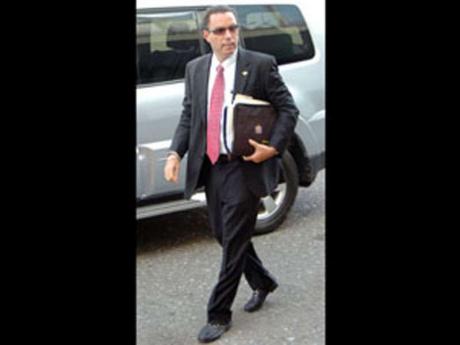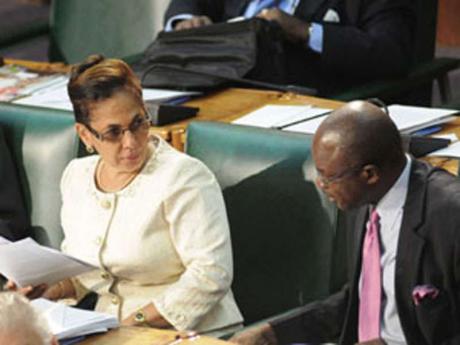Half-truths and comic contradictions
Ken Jones, Contributor
Columnist Devon Dick, writing with a tone of absolute authority, may have unwittingly delivered half-truths that do not add up to a whole fact. In stating his case against according full rights to Jamaica's dual citizens, he asserts that dual citizenship is not synonymous with foreign allegiance; and that, "if one has citizenship of another country by birth, one is not disqualified from the Jamaican Parliament". I respectfully submit that neither statement is exactly right.
Jamaican law recognises, approves and accepts dual citizenship, whether by birth or by naturalisation; and since naturalisation requires a pledge of allegiance to a foreign country, it follows that Jamaica cannot sensibly object to such a pledge. It is an act of comic contradiction to agree to dual citizenship while at the same time denouncing the pledge of allegiance to a foreign country. The two acts go together. They are synergetic and, to use another word: synonymous!
Dick's declaration about disqualification from Parliament requires further explaining. Daryl Vaz, a dual citizen by birth, was disqualified from Parliament by a Jamaican court. My understanding is that this ruling equated the renewal of a foreign passport (or travelling on such passport) with the act of swearing allegiance. The chief justice had ruled:
"I hold further that by his positive acts of renewing and travelling on his United States passport, the first respondent (Vaz) has, by virtue of his own act, acknowledged his allegiance, obedience or adherence to the United States of America."
Here, again, is a contradiction. No citizen or dual citizen (by birth or naturalisation) is ever required to make a pledge of allegiance when applying for or renewing a passport. Passport application forms do not ask if you have dual or single nationality. What is required is proof of citizenship, either by a previous United States passport, certificate of naturalisation or certificate of citizenship. In spite of this, Vaz, who by circumstances of birth was not required to pledge allegiance to America or Jamaica, was, by Jamaican law, disqualified because he renewed the passport he had from childhood.
pledge of allegiance
Pastor Dick states emphatically that "becoming a naturalised US citizen requires absolute allegiance". He goes further to say: "The oath is not only absolute, exclusive and comprehensive in its allegiance, but it also requires one to renounce one's Jamaican citizenship." Well, it is true that one cannot become a naturalised citizen of any country without pledging allegiance. However, the statement is only half true, because it neglects to mention that the US does not enforce this renunciation; and that, in any event, renunciation cannot happen without the authorisation of the Jamaican Government. I am not aware that any of the legislators called upon to resign ever renounced their Jamaican citizenship at any time. Yet, we have spent $100 million to take them out, and have them sent back to Parliament.
The existing Jamaican Constitution implies, in Section 40, that the holding of dual nationality automatically brings a person's loyalty into question, creates a potential conflict of interest and stamps the individual as unworthy of being a parliamentary representative. This is another comic contradiction; for it also states that a foreigner can be trusted if he/she comes from any place having membership in the British Common-wealth. We can trust a Pakistani, but not a Jamaican-American! Strangely, so many of our legislators live quietly with this British-inspired ruling, but speak loudly against the validity of the Privy Council.
Another glib remark, as echoed by Pastor Dick, is: "A legislator could make laws to which he or she knows that he or she will not necessarily be subjected." It is certainly a long stretch of the imagination to assert that a lone legislator sitting among 60 can pass a law of any kind. Even if that were possible, the dual citizen would still be subject to the law, unless he/she took up permanent residence in another country. It beats me how people can go overturning pebbles in search of phantoms.
The pastor states that the use of dual citizens as legislators "... suggests that we do not have committed and loyal people in our country who are capable of managing our own affairs." That's one way of looking at it. The other is that by allowing full rights to all persons holding Jamaican citizenship, we enhance the possibility of enlarging the pool of human resources needed for socio-political and economic development of the country.
The crux of this whole matter of dual citizenship in Jamaica is that, unlike the US, the Jamaican Government continues passive obedience to a rule authorised by its former colonial ruler; a restriction that the mother country does not impose upon itself. Dual citizenship is not of the past; it is of the present and the future. The trend and practice in the United States, Canada, Europe, United Kingdom and a hundred other countries is to allow their nationals to hold citizenship elsewhere without losing any of their natural, human or democratic rights. Jamaicans cannot continue following politicians who delight in spreading fear and distrust among us. We must wake up to reality and live out the true meaning of our motto: 'Out of Many, One People'.
Email feedback to columns@gleanerjm.com.


